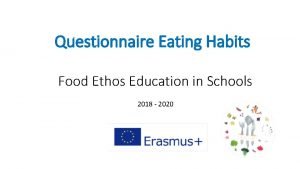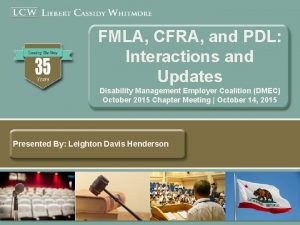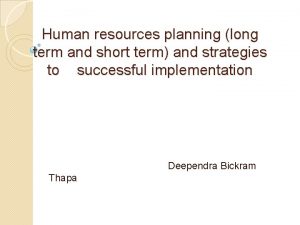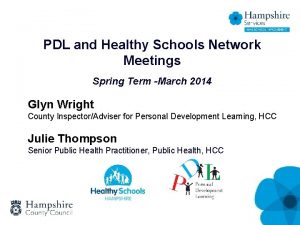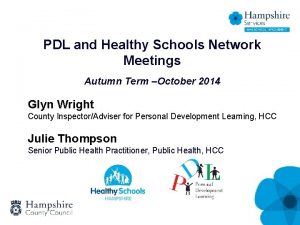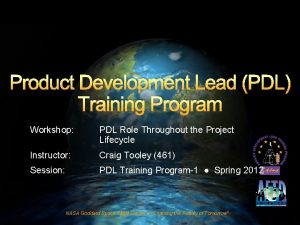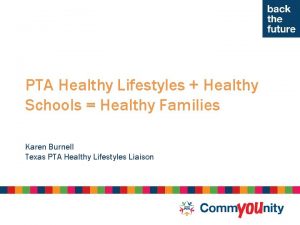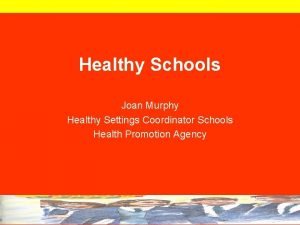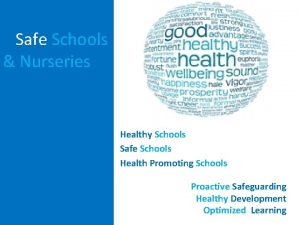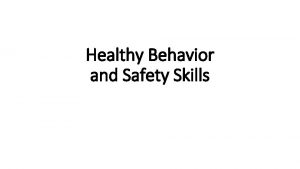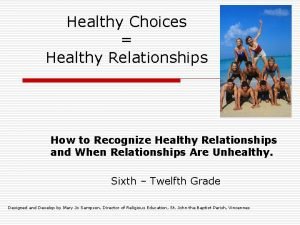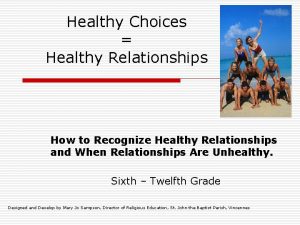PDL and Healthy Schools Network Meetings Summer Term


































- Slides: 34

PDL and Healthy Schools Network Meetings Summer Term –June 2015 Glyn Wright County Inspector/Adviser for Personal Development Learning, HCC Julie Thompson Senior Public Health Practitioner, Public Health, HCC Ian Wright Healthy Schools Coordinator, HC 3 S Steve Morton PDL Adviser, HIAS

MAKING SENSE OF PERSONAL DEVELOPMENT LEARNING Extended schools Extra curricular activities Outdoor Education – e. g Trailblazers Citizenship and Rights Respect and Responsibility, Volunteering/ active citizenship e. g. peer mentoring PSHE-PW Study Support Personal Social Health & economic Education (PSHE-PW) Safety Education & Education for sustainable development Functional skills: • Communication • Numeracy • ICT • Working together • Improving own performance • Problem solving Sex and relationships education (PSHE PW) Social, Emotional Aspects of Learning SEAL PSHE PW Work related learning PSHE EW Helping children and young people to: • Be Healthy, • Stay Safe, • Enjoy and Achieve, • Make a Positive Contribution • Have Economic Well Being Religious education Physical activity Drugs education incl. alcohol and tobacco Personal learning and thinking skills: Team worker Self-manager Independent enquirer Reflective learner Creative thinker Effective participator Careers education and guidance PSHE EW Enterprise education PSHE EW Financial capability PSHE EW Individual learning plans & e-profiles E-Profile AND PORTFOLIO – ASSESSMENT, RECORDING and ACTION PLANNING

Programme • • • SMSC and British Values Ofsted – Personal development, behaviour and welfare Networking opportunities Healthy Schools update School meals update Sun awareness and smoking prevention

Spiritual, Moral, Social Cultural development and British Values • All maintained schools must meet the requirements set out in section 78 of the Education Act 2002 and promote the spiritual, moral, social and cultural (SMSC) development of their pupils. • Through ensuring pupils’ SMSC development, schools can also demonstrate they are actively promoting fundamental British values. • Meeting requirements for collective worship, establishing a strong school ethos supported by effective relationships throughout the school, and providing relevant activities beyond the classroom are all ways of ensuring pupils’ SMSC development. • Pupils must be encouraged to regard people of all faiths, races and cultures with respect and tolerance.

SMSC and British Values con. • It is expected that pupils should understand that while different people may hold different views about what is ‘right’ and ‘wrong’, all people living in England are subject to its law. • The school’s ethos and teaching, which schools should make parents aware of, should support the rule of English civil and criminal law and schools should not teach anything that undermines it. • If schools teach about religious law, particular care should be taken to explore the relationship between state and religious law. • Pupils should be made aware of the difference between the law of the land religious law.

Fundamental ‘British values’ • Schools should promote the fundamental British values of democracy, the rule of law, individual liberty, and mutual respect and tolerance of those with different faiths and beliefs. • This can help schools to demonstrate how they are meeting the requirements of section 78 of the Education Act 2002, in their provision of SMSC. • Actively promoting the values means challenging opinions or behaviours in school that are contrary to fundamental British values. • Attempts to promote systems that undermine fundamental British values would be completely at odds with schools’ duty to provide SMSC. • The Teachers’ Standards expect teachers to uphold public trust in the profession and maintain high standards of ethics and behaviour, within and outside school. This includes not undermining fundamental British values.

Through their provision of SMSC, schools should: • enable students to develop their self-knowledge, selfesteem and self-confidence; • enable students to distinguish right from wrong and to respect the civil and criminal law of England; • encourage students to accept responsibility for their behaviour, show initiative, and to understand how they can contribute positively to the lives of those living and working in the locality of the school and to society more widely; • enable students to acquire a broad general knowledge of and respect for public institutions and services in England;

Through their provision of SMSC, schools should: • further tolerance and harmony between different cultural traditions by enabling students to acquire an appreciation of and respect for their own and other cultures • encourage respect for other people • encourage respect for democracy and support for participation in the democratic processes, including respect for the basis on which the law is made and applied in England.

Understanding and knowledge expected of pupils • an understanding of how citizens can influence decision-making through the democratic process; • an appreciation that living under the rule of law protects individual citizens and is essential for their wellbeing and safety • an understanding that there is a separation of power between the executive and the judiciary, and that while some public bodies such as the police and the army can be held to account through Parliament, others such as the courts maintain independence; • an understanding that the freedom to choose and hold other faiths and beliefs is protected in law;

Understanding and knowledge expected of pupils con. • an acceptance that other people having different faiths or beliefs to oneself (or having none) should be accepted and tolerated, and should not be the cause of prejudicial or discriminatory behaviour; and • an understanding of the importance of identifying and combatting discrimination. NB. It is not necessary for schools or individuals to ‘promote’ teachings, beliefs or opinions that conflict with their own, but nor is it acceptable for schools to promote discrimination against people or groups on the basis of their belief, opinion or background.

Examples of actions that a school can take • include in suitable parts of the curriculum, as appropriate for the age of pupils, material on the strengths, advantages and disadvantages of democracy, and how democracy and the law works in Britain, in contrast to other forms of government in other countries; • ensure that all pupils within the school have a voice that is listened to, and demonstrate how democracy works by actively promoting democratic processes such as a school council whose members are voted for by the pupils; • use opportunities such as general or local elections to hold mock elections to promote fundamental British values and provide pupils with the opportunity to learn how to argue and defend points of view; • use teaching resources from a wide variety of sources to help pupils understand a range of faiths, and • consider the role of extra-curricular activity, including any run directly by pupils, in promoting fundamental British values.

Ofsted September 2015 -Effectiveness of leadership and management Inspectors will make a judgement on the effectiveness of leadership and management by evaluating, where this is applicable, the extent to which leaders, managers and governors: • • provide a curriculum that has suitable breadth, depth and relevance so that it meets any relevant statutory requirements, as well as the needs and interests of children, learners, employers and the local community and nationally successfully plan and manage the curriculum, learning programmes and careers advice so that all children and learners get a good start and are well prepared for the next stage in their education or training actively promote equality and diversity and fundamental British values, tackle bullying and discrimination and narrow any gaps in achievement between different groups of children and learners make sure that arrangements to protect children, young people and learners meet all statutory requirements and promote their welfare.

Personal development, behaviour and welfare Inspectors will make a judgement on the personal development, behaviour and welfare of children and learners by evaluating, where this is applicable, the extent to which the provision is successfully promoting or supporting children’s and learners’: • prompt and regular attendance at sessions or work (for children and learners of school age and older) • following of any guidelines for behaviour and conduct, including management of their own feelings and behaviour, and around bullying, and how they relate to others • understanding of how to keep themselves safe from relevant risks such as exploitation and extremism, including when using the internet and social media • personal, social, moral, cultural and spiritual development, including through access to cultural experiences and work experience so that they are well prepared to respect others and contribute to wider society and life in Britain today

Personal development, behaviour and welfare con. • knowledge of how to keep themselves healthy, including through exercising and healthy eating • self-confidence, self-assurance and knowledge of their potential to be a successful learner • choices about the next stage of their education, employment, self-employment or training, where relevant, from independent careers advice and guidance • where relevant, employability skills so that they are well prepared for the next stage of their education, employment, self-employment or training. • While the inspection criteria for this judgement will be consistent across maintained schools, academies, FE and skills providers, nonassociation independent schools and registered early years settings, it may be reported on under an age-specific heading (for example ‘behaviour and welfare’ for schools and ‘personal development and welfare’ for FE and skills) in order to ensure that it is well understood by the sector in question.

Healthy Schools Update engagement with the process • 89 schools have submitted whole school review and achieved Hampshire Healthy Schools Status • 15 schools have renewed their whole school reviews after the recommended 2 year interval • 7 schools have achieved the Challenge Award • Training held biannually. Next date Friday 9 Oct. 22 schools already signed up. Code: PDLC 0834 • Following date: Thursday 11 Feb 2016

Key dates in the next few months • Quality Assurance Group. Next submission date: Thursday 2 July 2015. Following date: 11/11/15 • Network dates: To be confirmed but expected to be: – Gosport: Tue 13 Oct – Basingstoke: Wed 14 Oct – Winchester: Thu 16 Oct – New Forest: Wed 21 Oct See https: //learningzone. hants. gov. uk/ under course code PDLC 1831 for details nearer the date

Key standards in teaching about body image • Developed by the PSHE Association & funded by the Government Equalities Office. • Guidance on teaching about body image as part of the PSHE curriculum. Suitable for Key Stages 1 -5. • Includes a range of issues overweight/ obesity, eating disorders, LGBT, Black and minority ethnic (BME), disability or disfigurement, self-harm scars • Includes ‘Avoiding weight stigmatisation’ • See PSHE Ass website

New Disney inspired resources coming to schools in June! Being active every day helps us all to stay healthy. Change 4 Life's new schools pack makes it easy for teachers to fit fun 10 -minute bursts of action into the school day. Every 10 minutes counts towards the 60 minutes of exercise that primary school children should do every day. That's why C 4 L & Disney have teamed up once again to get children and their families moving each day. Free packs of teaching resources will be delivered to schools from June 1 onwards, via the School Fruit and Vegetable Scheme Register your school as a Change 4 Life local supporter to receive the latest news and resources.

School Food Update Ofsted Framework from September 2015 • Under the common inspection framework for Ofsted from September, they will inspect “how children and learners keep themselves healthy, including through healthy eating. ” As part of this, Inspectors will look at “the food on offer and visit the canteen to see the atmosphere and culture in the dining space and the effect this has on pupils’ behaviour”. Inspectors will also look at “the breadth and balance of the curriculum, of which practical cookery is now a part. ” • This was in Briefing 11. Are you seeing School Meal Update Briefings? They are on Healthy Schools website.

Importance of School Food and Positive Lunchtimes • Public Health England make link between health and attainment. Never has there been a greater need for high quality PDL. • Ideas from Jenny Mosley in most recent PDL Newsletter which will help improve lunchtimes and thereby improve afternoon learning. • We are already working in some schools and forming smaller clusters to learn from each other.

School Meal Update Infants, Juniors and Primary • Best schools can do 100% so it is possible. • Local support through HC 3 S which includes £ 400 to help with the lunchtime in schools with low numbers of UIFSM (below 70%). This includes both infant and primary. • HC 3 S are supporting most vulnerable junior schools. Three key indicators are – Uptake overall (43%) – Uptake of FSM (76%) – Paid uptake (35%)

School Meals Update Key Success Factors • Heads drive success – – Eat each day with the children Regularly update children in assembly Value lunchtime and the staff who make it happen Act as advocates for the children in ensuring the experience is a good one – Ensure that the voice of the children is heard in establishing a good ambience and good routines

School Meal Uptake Key Success Factors • Adults eating with the children really is crucial. Schools trying imaginative ways of increasing this q. Staff rota – eat with children once a fortnight! On PPA day? q. Inviting parents in to eat with the children q. Any visitors stay and have lunch with the children q. Governors come in and meet the children over lunch

School Meals Update Key Success Factors • Keep queues to a minimum – Bring the children in and sit them straight down. Call them to the servery one table at a time – Only call the children in when there is space for them. Use walkie talkies to link inside and outside. – Have cutlery and water on the table so they don’t slow down the queue collecting them. This also improves the dining ambience – Have desserts in a separate place for children to collect – Don’t ask children lots of questions at the point of service. Get their main option sorted out at the start of the day. Put vegetables on their plate as a matter of course.

School Meals Update Key Success Factors • Involve the children to give them a sense of ownership. Make lunchtime an “Event” each day that the children look forward to and enjoy. – Involve them in choice of plates, furniture, colours, etc – Display their healthy eating messages in the hall – Talk to them regularly in School Council, Class Council, Circle Time, Assembly – Give them positions of responsibility to support at lunchtime such as water monitors, dessert monitors, table cleaners, cutlery monitors. Make them high profile roles that children need to apply for. Have lunch staff on any interview panel. Give them SLT backing.

School Meals Update Key Success Factors • Put the school’s endorsement of the school dinner as the healthy option on the website and in communications to parents. – Use wording that makes it clear that children are expected to eat the Free School Meal where they are entitled either as the old style Benefits related FSM or as the Universal Infant Free School meal – Suggested wording example….

Use and personalise • At …………… School, we believe that the best option for children at lunchtime is to have the hot school dinner, provided through our partnership with HC 3 S. We expect that parents of children in Key Stage 1 will take up the option of the universal infant free school meal. This is because we believe that the hot school dinner option is much better for the children’s learning and health. We recognise the evidence that states Children are better prepared for learning if they eat well Children make more progress if they have eaten the right nutritional lunch Only 1% of packed lunches provide the correct nutrition Eating hot dinners is an important social occasion and the children learn vital social skills • HC 3 S provide all the nutrients that children require through the week. They produce a menu which has a three-weekly cycle and is available for parents to view. • Our goal is to have ZERO packed lunches.

School Meals Update Key Success Factors • Give parents the opportunity to come in and try the food. – When a year group is out, invite parents of another year group in to eat with the children – Have a special Induction meal in July for new children and their parents as part of the induction programme. – Have tasters available at parents events, both during the day and in the evenings. This is particularly important at New Intake Evening – Take tasters out to the parents waiting at the gate at the end of the day. Free food always goes down well and shows that the school really means business when it comes to promoting good food habits.

School Meals Update Key Success Factors • Ban packed lunches altogether! – Very small number of schools have gone down this road. However… • Don’t make packed lunches a more attractive option for the children (less queuing, longer playtime) • Consider packed lunch policy within Whole School Food Policy and banning certain items. E. g. Limit crisps to once a week only (on the day that school dinners are allowed chips!). Brown bread only? • Keep parents informed about the poor nutritional content of most packed lunches. Use evidence available on Healthy Schools Website. • Be ready to challenge parents who are resistant! Do so on the grounds of nutrition, behaviour and attainment, all of which are better if the children eat the school meal.

Supporting the Whole School Approach to Lunchtimes • Lunchtime is your “Cuprinol” time! Does your school’s value system does what it says on the tin? Are lunchtimes for your children a safe and happy time or does their behaviour radically alter? Do you spend part of many afternoons dealing with issues that arose at lunchtime? • We can help! Call us.

Sun Awareness Sun safe behaviour The good news is that 9 out of 10 skin cancers can be prevented if you follow simple measures ……. • Use a high protection sunscreen – min. SPF 30 with a high UVA rating (4 star minimum) • Apply sunscreens generously & frequently (2 tsps for head, arms and neck, 2 tbsp for entire body) - 20 mins before exposure to sun - reapply every two hours - reapply after towel drying, perspiring & swimming

Sun Safe Behaviour • Protect skin using clothing with close weave plus wide brimmed hat, UV protection sun glasses • Seek shade when sunny between 11 am & 3 pm • Keep babies & young children out of direct sunlight • Check all your skin every month and notify GP of any changes to mole or area of skin

Consider… • • • School Environment… Shade? Access to water Sun hats? Sun screen/cream Staff knowledge… dispelling myths? Accreditation available, online resources etc. www. sunsafeschools. co. uk www. oksunsafetycode. com

Smoking Prevention • Schools survey on smoking, drinking and drugs with approx. 5000 11 -16 year olds: findings due July 2015 and will inform future programme for schools. • Plans to develop new online resource for secondary schools on smoking (and linking with drugs and alcohol). • Targeted work with schools in higher prevalence areas, including peer education programme. • Stop smoking support available for young people from Quit 4 Life: www. quit 4 life. nhs. uk • For more information, contact sarah. preece@hants. gov. uk
 Meeting bloody meetings
Meeting bloody meetings Discussion leader
Discussion leader Meetings bloody meetings 5 points
Meetings bloody meetings 5 points Safety reach and target schools
Safety reach and target schools Healthy food healthy mind journal
Healthy food healthy mind journal Healthy soil healthy life poster ideas
Healthy soil healthy life poster ideas Healthy community poster
Healthy community poster Healthy nurse healthy nation
Healthy nurse healthy nation Emotionally healthy schools
Emotionally healthy schools Office of healthy schools
Office of healthy schools Healthy eating questionnaire for schools
Healthy eating questionnaire for schools Powerschool huntsville city schools login
Powerschool huntsville city schools login Principal fibres of pdl
Principal fibres of pdl P 1687
P 1687 Formation of pdl
Formation of pdl Pdl scanner
Pdl scanner Kentucky medicaid pdl
Kentucky medicaid pdl Fmla/cfra pdl comparison chart
Fmla/cfra pdl comparison chart Pdl training
Pdl training Oxytalin
Oxytalin Periodontal ligament space radiograph
Periodontal ligament space radiograph Dementie
Dementie Huisarts tasseron
Huisarts tasseron Huntsville reading program
Huntsville reading program Short term planning and long term planning
Short term planning and long term planning Ffa reporter symbol
Ffa reporter symbol Ffa emblem parts
Ffa emblem parts Short term human resources
Short term human resources Difference between long term and short term liabilities
Difference between long term and short term liabilities Long-term liabilities examples
Long-term liabilities examples Short term goals examples for students
Short term goals examples for students Short term finance planning
Short term finance planning Assisi and ohito meetings
Assisi and ohito meetings Meetings incentives conferences and exhibitions (mice)
Meetings incentives conferences and exhibitions (mice) Fbla officer duties
Fbla officer duties










